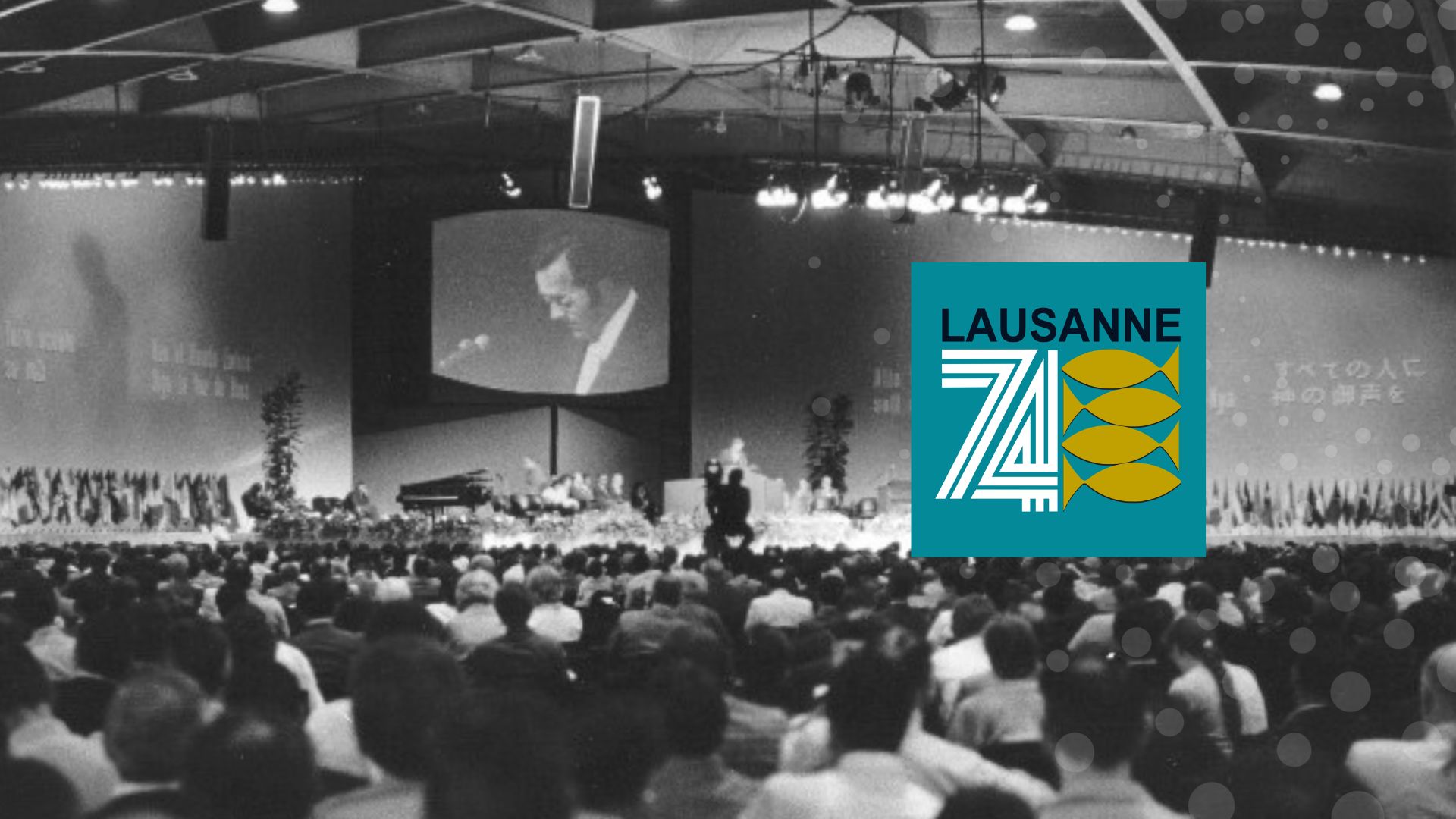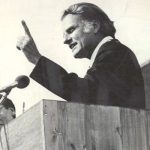The Gospel of the Kingdom, according to Jesus, is to be “preached in all the world for a witness,” after which “shall the end come.”
There are many things about this that go beyond my understanding. I cannot grasp exactly when a nation can be said to be evangelized, even though I heard it explained at Lausanne several times. I do not understand why God himself did not do the evangelizing. Why did he select instruments like us to do it? Why did he not choose the angels? Why did he give us this awesome responsibility? Why did Christ issue this tremendous command, “Go into all the world and proclaim the Gospel?” I do not understand all of that.
But we are like the Apostle Paul – we know something of the terror of the Lord and the love of Christ on the cross. We feel compassion for fellow human beings who are lost in the darkness of this world. We accept this command of our Lord Jesus Christ, and today we are closer to fulfilling it than ever before in the history of the Christian church.
We came to Lausanne as messengers, as proclaimers, as evangelists, as teachers, as pastors, as professors, as theologians, but in a sense, we are all evangelists. Paul told Timothy, “Do the work of an evangelist.” And as we leave Lausanne I say to each person the same words: “Do the work of an evangelist.”
We leave here with a vast array of knowledge about different aspects of theology. One of the participants was overheard to say, “I have theological indigestion.” Our vision of the world has been enlarged. We have been astonished at the ability of the “third world” participants. We have learned something about the areas of our ministry. We have wept together, we have debated together, we have laughed together.
We have not always agreed on everything, but that brings us to the word in 2 Peter 3:11, “Since all these things are thus to be dissolved, what sort of persons ought you to be in lives of holiness and godliness…” In view of the world in which we live, and the return of the King, what kind of persons should you and I be? Psalm 12 reads in The Living Bible, “Lord, Help! Godly men are fast disappearing. Where in all the world can dependable men be found?” Are you a godly man, a godly woman? Are you dependable?
Our world is in a crisis of leadership. We want some person to step onto the stage of events with a formula for world peace. The human race is waiting for a hero, a leader, and someday that leader will appear. Jesus Christ will come with the solution to our complex problems.
Yes, the King is coming. Someday we will see the Son of man seated at the right hand of God and coming in the clouds of heaven. J.B. Phillips translates Colossians 3:4 to read, “One day Christ, the secret center of our lives, will show himself openly, and you will all share in that magnificent glory.”
One day Jesus Christ will show himself openly and you who have come to Lausanne from Malawi, from Chad, from Sikkim, from China, from America, from the Soviet Union, from everywhere – you will all share in his magnificent glory on that day. But our expectation of what is coming does not make us complacent in the meantime.
Critics of those who believe in the Second Advent claim that such a belief causes Christians to lose their incentive for work. It has been my experience that those who believe in the return of the Lord are the hardest workers, the most zealous and the most dedicated. We do not know that Christ is coming back in this century. We do not know the day or the hour of his return. But even if he were coming tonight, and we were certain of it, we would be busy about our Lord’s business.
At this Congress we have heard the groan of the world – groans for justice, groans for freedom, groans for wholeness, groans for salvation, groans for the redemption of the physical order. The agnostic asks, “If there is a God, why doesn’t he show?” Well, he is going to show himself. The King is on the way. In the twinkling of an eye, in a thousandth of a second, he will come. That leaves no opportunity for the Christian to recommit his life. It leaves no opportunity for the thief to repent, or for the prodigal to return home.
Now is the moment. Professor George Duffield has pointed out that in the New Testament epistles 22 verses call for purity, patience and service in the light of the glorious return of Jesus Christ. I don’t know whether or not we shall hold another Congress. We certainly will never meet together again like this, but we will see each other again in that day. All the groanings, the sufferings, the tears, the death, will be gone.
Peter Beyerhaus said that the human race has three principal enemies: sin, Satan, and death; and that on the cross our Lord Jesus Christ nullified all three. We are now awaiting the climactic moment and the total fulfilment of what was done on the cross.
I believe there are two strains in prophetic Scripture. One leads us to understand that as we approach the latter days and the Second Coming of Christ, things will become worse and worse. Joel speaks of “multitudes, multitudes, in the valley of decision!” The day of the Lord is near in the valley of decision. He is speaking of judgment.
But I believe as we approach the latter days and the coming of the Lord, it could be a time also of great revival. We cannot forget the possibility and the promise of revival, the refreshing of the latter days (“the latter rains” of Hosea), or the outpouring of the Spirit promised in Joel 2:28, and repeated in Acts 2:17. That will happen right up to the advent of the Lord Jesus Christ. James seems to associate the “latter rains” with the return of Christ.
Evil will grow worse, but God will be mightily at work at the same time. I am praying that we will see in the next months and years the “latter rains,” a rain of blessings, showers falling from heaven upon all the continents before the coming of our Lord. There is a mystery of iniquity, but there is also a mystery of righteousness, and both are working simultaneously.
A Chinese proverb says, “The journey of a thousand miles begins with the first step.” Your journey home from Lausanne begins today, and the first step should be one of rededication and recommitment. You know what God has been saying to you these past ten days; I know what he has convicted me of, and what I must do.
Sam P. Jones was a Methodist evangelist in America 100 years ago. A woman came forward in one of his meetings and said, “Dr. Jones, God is speaking to me about sin in my life, but I don’t know exactly which one or what.” And Sam Jones said, “Kneel down and guess at it.” As he told the story, “The moment she knelt down she hit it right on the head.”
If you are to be an instrument prepared by the hand of God as you go home, I would say to you first, you must have had an experience with Christ. John Wesley once said, “What a dreadful thing it would be for me if l should be ignorant of the power of the truth I am preparing to proclaim.” Jesus had twelve men who travelled with him, and no one suspected that something was wrong with one of them. No one suspected Judas. Before you leave here, make sure of your personal relationship with Jesus Christ.
Second, you will leave Lausanne to go back, in some cases, to dangerous situations. You may be in physical danger; you may be misunderstood, misquoted, misused. Paul lived in suffering and danger all the time. Yet he declared that he would glory in tribulation, and he seemed to become stronger and bolder in danger because he knew God was with him. There is nothing bolder than a righteous man. In the midst of danger God will be there.
Third, as messengers of God, we will often lead lonely lives. “All men forsook me,” said Paul. It is a price we have to pay; there is a loneliness in the Gospel. Yet you will not be alone because you will be ministered to by the Spirit of God, as Elijah was ministered to at the brook Cherith.
Fourth, a true messenger lives a burdened life. If he is the Lord’s vessel, he carries in his heart a burden for souls none can share but those who know it firsthand.
Fifth, there is an urgency to his message. Jeremiah said, “His word was in my heart a burning fire.” Is God’s Word in our hearts today a burning fire?
Sixth, the messenger needs a devotional life. The prayers of Abraham, Jacob, Moses, Nehemiah and Daniel marked a turning point in the history of nations. If our Lord Jesus Christ felt the need to spend nights praying, how much more do we need to spend time in prayer!
Seventh, the messenger of God will be a bold man. “Be filled with the Spirit,” says Paul. My experience has been that it is a continuing thing, like a perpetual spring. There have been times of flood, times of revival and renewal in our lives and churches and communities; but there is also that continual flowing spring. The fruits of the Spirit are not present just at floodtide. Love, joy, peace, patience, kindness, generosity, fidelity, power, self-control, should characterize our lives all the time.
Finally, the messenger will lead a disciplined life. The Lausanne Covenant says we are to adopt a simpler lifestyle. Every area is to be brought under the Lordship of Jesus Christ, so that he might be the disciplinarian.
The problems with which we wrestle as we go back to our places of service are in many cases not intellectual. They are deep down within the will. Are we willing to deny self and to take up the cross and follow the Lord? Are you willing? Am I willing?
The King is coming!

